University Nursing Assignment: Mark's Case Study and TICP in NRSG263
VerifiedAdded on 2023/01/19
|11
|3075
|84
Report
AI Summary
This report analyzes Mark's case study, focusing on the application of trauma-informed care and practice (TICP) principles within a nursing context. The assignment identifies three key issues that contributed to Mark's problematic substance use: inability to meet expectations, lack of support for depression, and social isolation. These issues are examined through the lens of TICP, highlighting the importance of empowerment, collaboration, and safety. The report then details how a mental health nurse can collaborate with Mark to promote his personal recovery, emphasizing the need for counseling, patient education, and rehabilitation. The role of the nurse is explored in conjunction with the multidisciplinary team, particularly the psychotherapist, to implement effective interventions like cognitive behavioral therapy (CBT) and mindfulness-based therapy (MBT) to address addiction, depressive symptoms, and bipolar disorder. Finally, the report discusses the application of TICP principles in engaging with the consumer, emphasizing safety, collaboration, and empowerment to facilitate the recovery process.
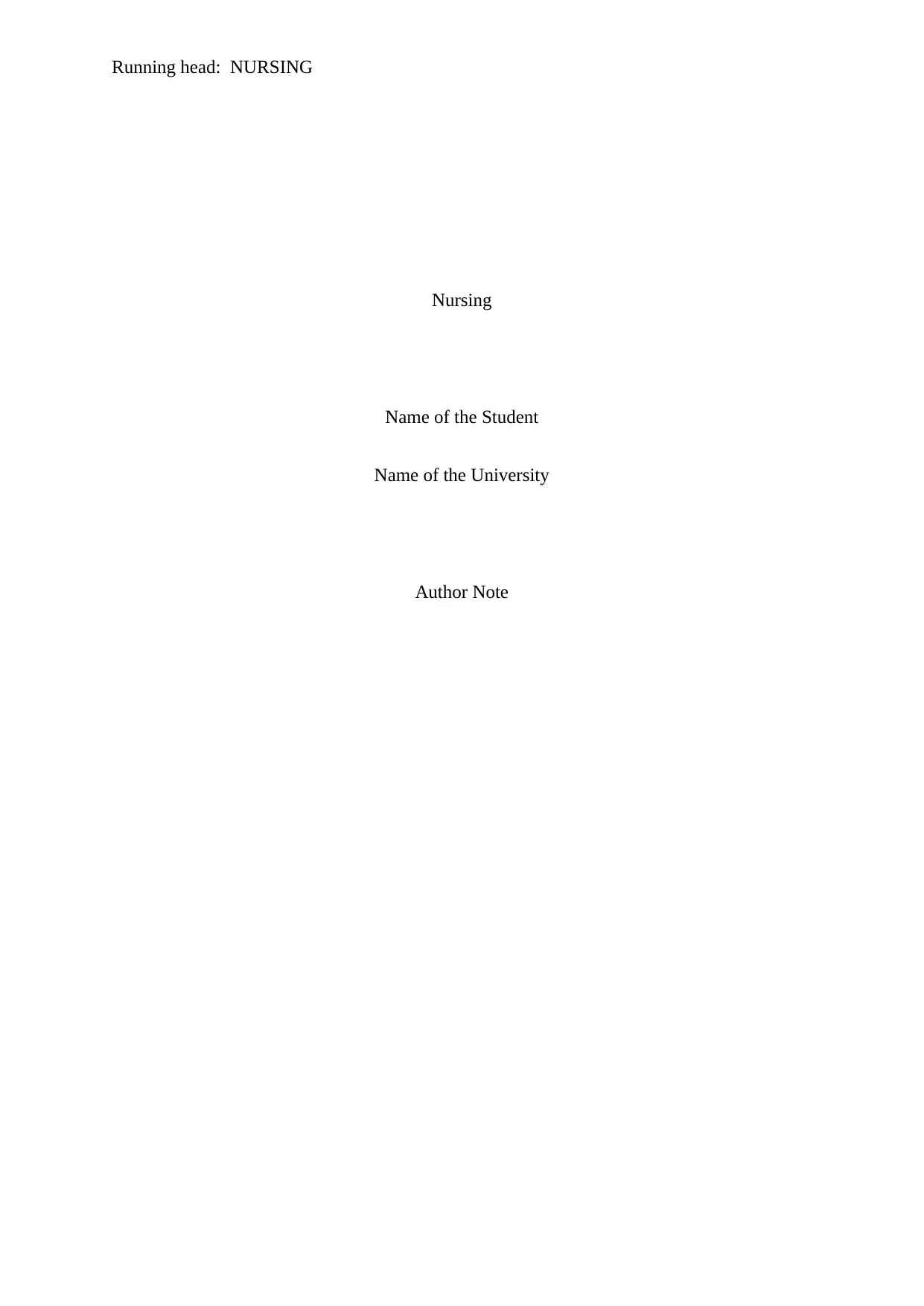
Running head: NURSING
Nursing
Name of the Student
Name of the University
Author Note
Nursing
Name of the Student
Name of the University
Author Note
Paraphrase This Document
Need a fresh take? Get an instant paraphrase of this document with our AI Paraphraser
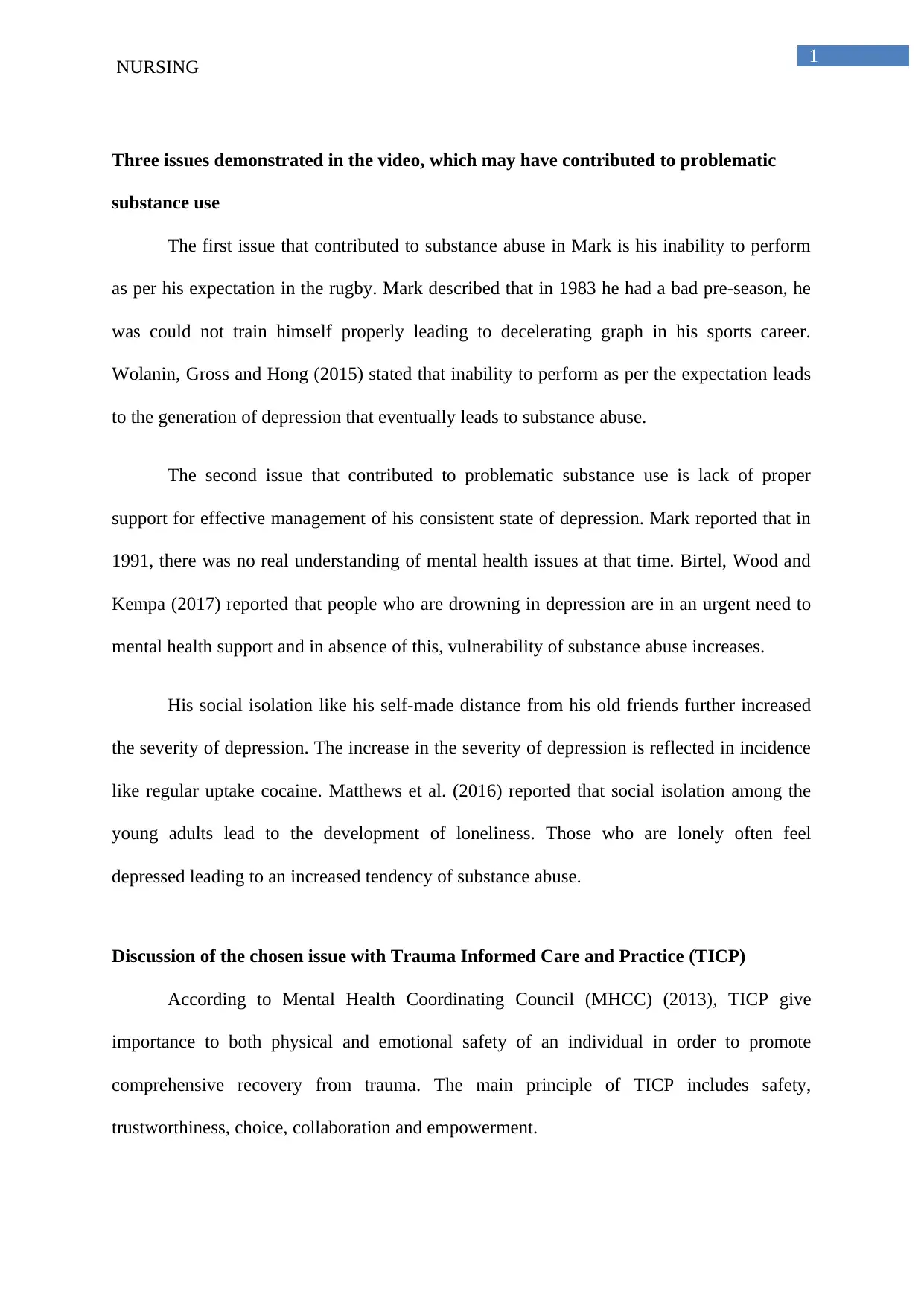
1
NURSING
Three issues demonstrated in the video, which may have contributed to problematic
substance use
The first issue that contributed to substance abuse in Mark is his inability to perform
as per his expectation in the rugby. Mark described that in 1983 he had a bad pre-season, he
was could not train himself properly leading to decelerating graph in his sports career.
Wolanin, Gross and Hong (2015) stated that inability to perform as per the expectation leads
to the generation of depression that eventually leads to substance abuse.
The second issue that contributed to problematic substance use is lack of proper
support for effective management of his consistent state of depression. Mark reported that in
1991, there was no real understanding of mental health issues at that time. Birtel, Wood and
Kempa (2017) reported that people who are drowning in depression are in an urgent need to
mental health support and in absence of this, vulnerability of substance abuse increases.
His social isolation like his self-made distance from his old friends further increased
the severity of depression. The increase in the severity of depression is reflected in incidence
like regular uptake cocaine. Matthews et al. (2016) reported that social isolation among the
young adults lead to the development of loneliness. Those who are lonely often feel
depressed leading to an increased tendency of substance abuse.
Discussion of the chosen issue with Trauma Informed Care and Practice (TICP)
According to Mental Health Coordinating Council (MHCC) (2013), TICP give
importance to both physical and emotional safety of an individual in order to promote
comprehensive recovery from trauma. The main principle of TICP includes safety,
trustworthiness, choice, collaboration and empowerment.
NURSING
Three issues demonstrated in the video, which may have contributed to problematic
substance use
The first issue that contributed to substance abuse in Mark is his inability to perform
as per his expectation in the rugby. Mark described that in 1983 he had a bad pre-season, he
was could not train himself properly leading to decelerating graph in his sports career.
Wolanin, Gross and Hong (2015) stated that inability to perform as per the expectation leads
to the generation of depression that eventually leads to substance abuse.
The second issue that contributed to problematic substance use is lack of proper
support for effective management of his consistent state of depression. Mark reported that in
1991, there was no real understanding of mental health issues at that time. Birtel, Wood and
Kempa (2017) reported that people who are drowning in depression are in an urgent need to
mental health support and in absence of this, vulnerability of substance abuse increases.
His social isolation like his self-made distance from his old friends further increased
the severity of depression. The increase in the severity of depression is reflected in incidence
like regular uptake cocaine. Matthews et al. (2016) reported that social isolation among the
young adults lead to the development of loneliness. Those who are lonely often feel
depressed leading to an increased tendency of substance abuse.
Discussion of the chosen issue with Trauma Informed Care and Practice (TICP)
According to Mental Health Coordinating Council (MHCC) (2013), TICP give
importance to both physical and emotional safety of an individual in order to promote
comprehensive recovery from trauma. The main principle of TICP includes safety,
trustworthiness, choice, collaboration and empowerment.
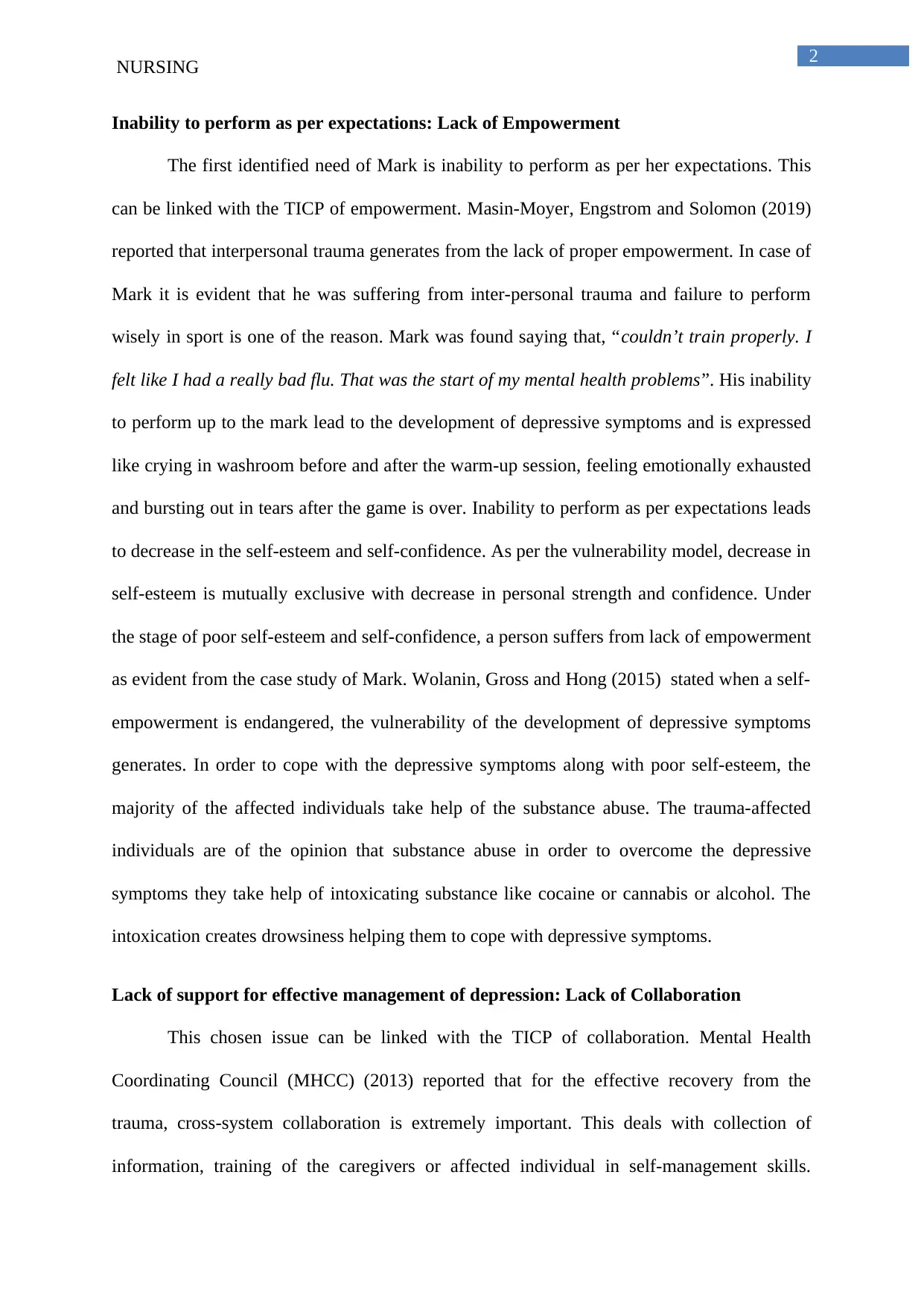
2
NURSING
Inability to perform as per expectations: Lack of Empowerment
The first identified need of Mark is inability to perform as per her expectations. This
can be linked with the TICP of empowerment. Masin-Moyer, Engstrom and Solomon (2019)
reported that interpersonal trauma generates from the lack of proper empowerment. In case of
Mark it is evident that he was suffering from inter-personal trauma and failure to perform
wisely in sport is one of the reason. Mark was found saying that, “couldn’t train properly. I
felt like I had a really bad flu. That was the start of my mental health problems”. His inability
to perform up to the mark lead to the development of depressive symptoms and is expressed
like crying in washroom before and after the warm-up session, feeling emotionally exhausted
and bursting out in tears after the game is over. Inability to perform as per expectations leads
to decrease in the self-esteem and self-confidence. As per the vulnerability model, decrease in
self-esteem is mutually exclusive with decrease in personal strength and confidence. Under
the stage of poor self-esteem and self-confidence, a person suffers from lack of empowerment
as evident from the case study of Mark. Wolanin, Gross and Hong (2015) stated when a self-
empowerment is endangered, the vulnerability of the development of depressive symptoms
generates. In order to cope with the depressive symptoms along with poor self-esteem, the
majority of the affected individuals take help of the substance abuse. The trauma-affected
individuals are of the opinion that substance abuse in order to overcome the depressive
symptoms they take help of intoxicating substance like cocaine or cannabis or alcohol. The
intoxication creates drowsiness helping them to cope with depressive symptoms.
Lack of support for effective management of depression: Lack of Collaboration
This chosen issue can be linked with the TICP of collaboration. Mental Health
Coordinating Council (MHCC) (2013) reported that for the effective recovery from the
trauma, cross-system collaboration is extremely important. This deals with collection of
information, training of the caregivers or affected individual in self-management skills.
NURSING
Inability to perform as per expectations: Lack of Empowerment
The first identified need of Mark is inability to perform as per her expectations. This
can be linked with the TICP of empowerment. Masin-Moyer, Engstrom and Solomon (2019)
reported that interpersonal trauma generates from the lack of proper empowerment. In case of
Mark it is evident that he was suffering from inter-personal trauma and failure to perform
wisely in sport is one of the reason. Mark was found saying that, “couldn’t train properly. I
felt like I had a really bad flu. That was the start of my mental health problems”. His inability
to perform up to the mark lead to the development of depressive symptoms and is expressed
like crying in washroom before and after the warm-up session, feeling emotionally exhausted
and bursting out in tears after the game is over. Inability to perform as per expectations leads
to decrease in the self-esteem and self-confidence. As per the vulnerability model, decrease in
self-esteem is mutually exclusive with decrease in personal strength and confidence. Under
the stage of poor self-esteem and self-confidence, a person suffers from lack of empowerment
as evident from the case study of Mark. Wolanin, Gross and Hong (2015) stated when a self-
empowerment is endangered, the vulnerability of the development of depressive symptoms
generates. In order to cope with the depressive symptoms along with poor self-esteem, the
majority of the affected individuals take help of the substance abuse. The trauma-affected
individuals are of the opinion that substance abuse in order to overcome the depressive
symptoms they take help of intoxicating substance like cocaine or cannabis or alcohol. The
intoxication creates drowsiness helping them to cope with depressive symptoms.
Lack of support for effective management of depression: Lack of Collaboration
This chosen issue can be linked with the TICP of collaboration. Mental Health
Coordinating Council (MHCC) (2013) reported that for the effective recovery from the
trauma, cross-system collaboration is extremely important. This deals with collection of
information, training of the caregivers or affected individual in self-management skills.
⊘ This is a preview!⊘
Do you want full access?
Subscribe today to unlock all pages.

Trusted by 1+ million students worldwide
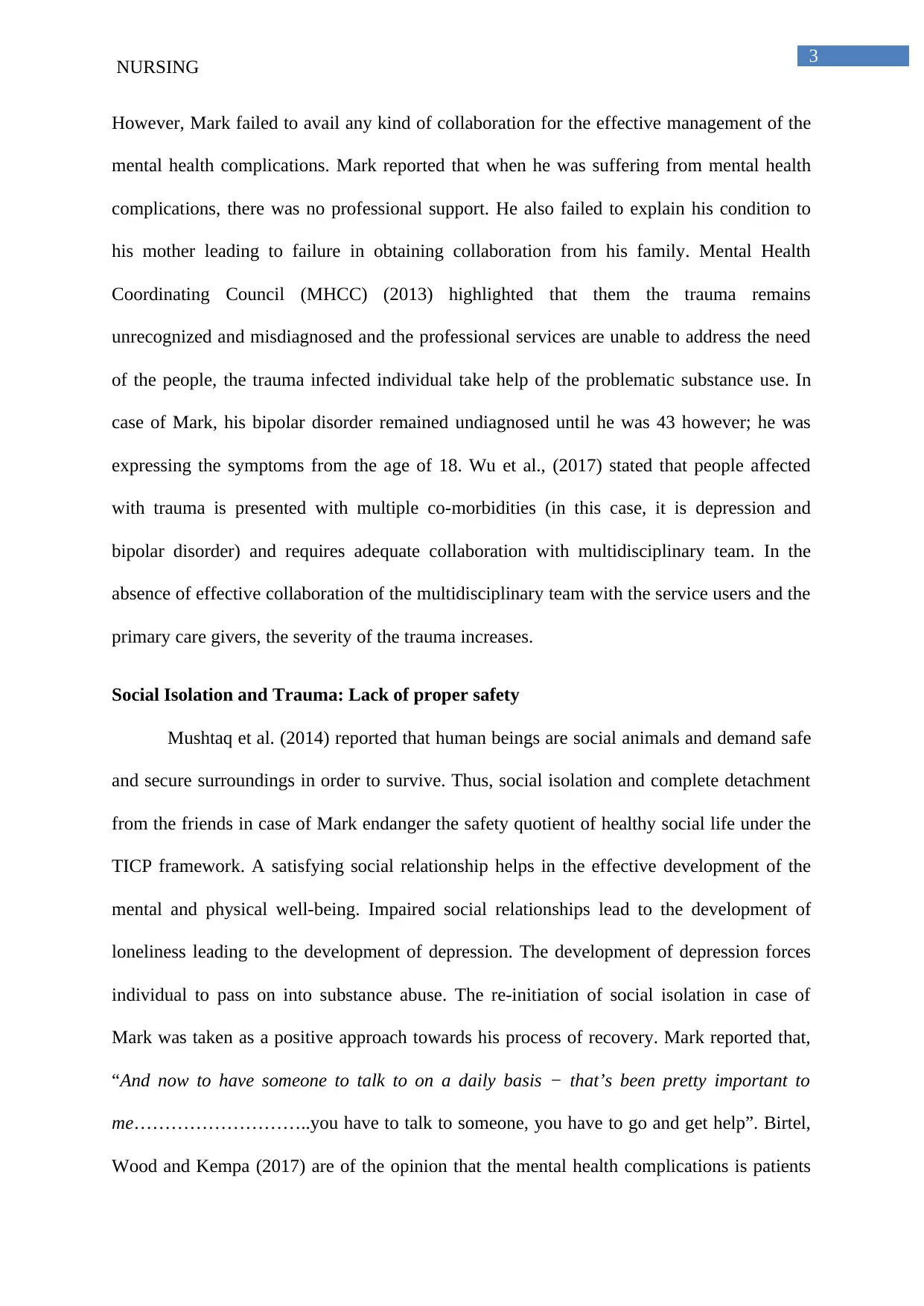
3
NURSING
However, Mark failed to avail any kind of collaboration for the effective management of the
mental health complications. Mark reported that when he was suffering from mental health
complications, there was no professional support. He also failed to explain his condition to
his mother leading to failure in obtaining collaboration from his family. Mental Health
Coordinating Council (MHCC) (2013) highlighted that them the trauma remains
unrecognized and misdiagnosed and the professional services are unable to address the need
of the people, the trauma infected individual take help of the problematic substance use. In
case of Mark, his bipolar disorder remained undiagnosed until he was 43 however; he was
expressing the symptoms from the age of 18. Wu et al., (2017) stated that people affected
with trauma is presented with multiple co-morbidities (in this case, it is depression and
bipolar disorder) and requires adequate collaboration with multidisciplinary team. In the
absence of effective collaboration of the multidisciplinary team with the service users and the
primary care givers, the severity of the trauma increases.
Social Isolation and Trauma: Lack of proper safety
Mushtaq et al. (2014) reported that human beings are social animals and demand safe
and secure surroundings in order to survive. Thus, social isolation and complete detachment
from the friends in case of Mark endanger the safety quotient of healthy social life under the
TICP framework. A satisfying social relationship helps in the effective development of the
mental and physical well-being. Impaired social relationships lead to the development of
loneliness leading to the development of depression. The development of depression forces
individual to pass on into substance abuse. The re-initiation of social isolation in case of
Mark was taken as a positive approach towards his process of recovery. Mark reported that,
“And now to have someone to talk to on a daily basis − that’s been pretty important to
me………………………..you have to talk to someone, you have to go and get help”. Birtel,
Wood and Kempa (2017) are of the opinion that the mental health complications is patients
NURSING
However, Mark failed to avail any kind of collaboration for the effective management of the
mental health complications. Mark reported that when he was suffering from mental health
complications, there was no professional support. He also failed to explain his condition to
his mother leading to failure in obtaining collaboration from his family. Mental Health
Coordinating Council (MHCC) (2013) highlighted that them the trauma remains
unrecognized and misdiagnosed and the professional services are unable to address the need
of the people, the trauma infected individual take help of the problematic substance use. In
case of Mark, his bipolar disorder remained undiagnosed until he was 43 however; he was
expressing the symptoms from the age of 18. Wu et al., (2017) stated that people affected
with trauma is presented with multiple co-morbidities (in this case, it is depression and
bipolar disorder) and requires adequate collaboration with multidisciplinary team. In the
absence of effective collaboration of the multidisciplinary team with the service users and the
primary care givers, the severity of the trauma increases.
Social Isolation and Trauma: Lack of proper safety
Mushtaq et al. (2014) reported that human beings are social animals and demand safe
and secure surroundings in order to survive. Thus, social isolation and complete detachment
from the friends in case of Mark endanger the safety quotient of healthy social life under the
TICP framework. A satisfying social relationship helps in the effective development of the
mental and physical well-being. Impaired social relationships lead to the development of
loneliness leading to the development of depression. The development of depression forces
individual to pass on into substance abuse. The re-initiation of social isolation in case of
Mark was taken as a positive approach towards his process of recovery. Mark reported that,
“And now to have someone to talk to on a daily basis − that’s been pretty important to
me………………………..you have to talk to someone, you have to go and get help”. Birtel,
Wood and Kempa (2017) are of the opinion that the mental health complications is patients
Paraphrase This Document
Need a fresh take? Get an instant paraphrase of this document with our AI Paraphraser
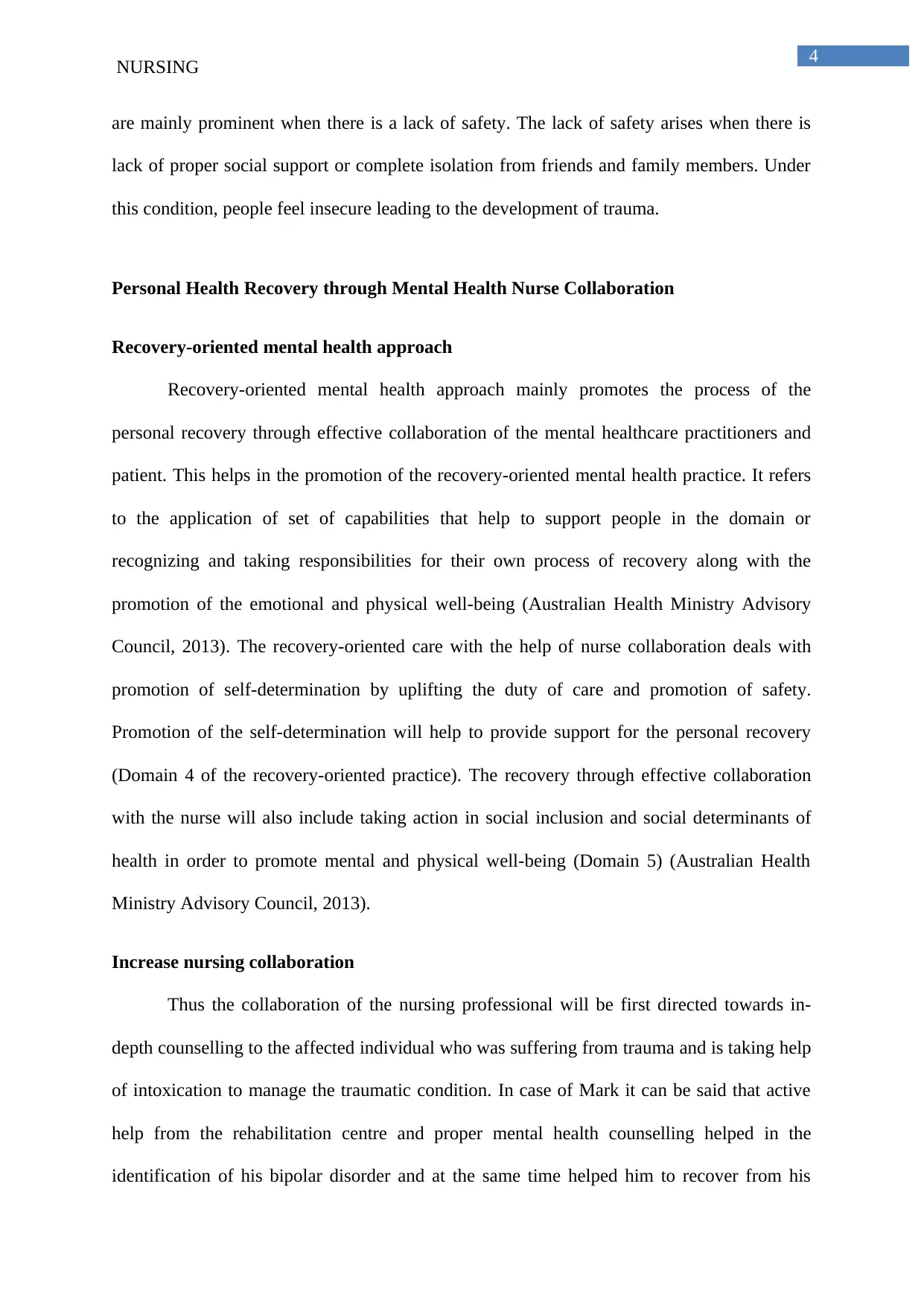
4
NURSING
are mainly prominent when there is a lack of safety. The lack of safety arises when there is
lack of proper social support or complete isolation from friends and family members. Under
this condition, people feel insecure leading to the development of trauma.
Personal Health Recovery through Mental Health Nurse Collaboration
Recovery-oriented mental health approach
Recovery-oriented mental health approach mainly promotes the process of the
personal recovery through effective collaboration of the mental healthcare practitioners and
patient. This helps in the promotion of the recovery-oriented mental health practice. It refers
to the application of set of capabilities that help to support people in the domain or
recognizing and taking responsibilities for their own process of recovery along with the
promotion of the emotional and physical well-being (Australian Health Ministry Advisory
Council, 2013). The recovery-oriented care with the help of nurse collaboration deals with
promotion of self-determination by uplifting the duty of care and promotion of safety.
Promotion of the self-determination will help to provide support for the personal recovery
(Domain 4 of the recovery-oriented practice). The recovery through effective collaboration
with the nurse will also include taking action in social inclusion and social determinants of
health in order to promote mental and physical well-being (Domain 5) (Australian Health
Ministry Advisory Council, 2013).
Increase nursing collaboration
Thus the collaboration of the nursing professional will be first directed towards in-
depth counselling to the affected individual who was suffering from trauma and is taking help
of intoxication to manage the traumatic condition. In case of Mark it can be said that active
help from the rehabilitation centre and proper mental health counselling helped in the
identification of his bipolar disorder and at the same time helped him to recover from his
NURSING
are mainly prominent when there is a lack of safety. The lack of safety arises when there is
lack of proper social support or complete isolation from friends and family members. Under
this condition, people feel insecure leading to the development of trauma.
Personal Health Recovery through Mental Health Nurse Collaboration
Recovery-oriented mental health approach
Recovery-oriented mental health approach mainly promotes the process of the
personal recovery through effective collaboration of the mental healthcare practitioners and
patient. This helps in the promotion of the recovery-oriented mental health practice. It refers
to the application of set of capabilities that help to support people in the domain or
recognizing and taking responsibilities for their own process of recovery along with the
promotion of the emotional and physical well-being (Australian Health Ministry Advisory
Council, 2013). The recovery-oriented care with the help of nurse collaboration deals with
promotion of self-determination by uplifting the duty of care and promotion of safety.
Promotion of the self-determination will help to provide support for the personal recovery
(Domain 4 of the recovery-oriented practice). The recovery through effective collaboration
with the nurse will also include taking action in social inclusion and social determinants of
health in order to promote mental and physical well-being (Domain 5) (Australian Health
Ministry Advisory Council, 2013).
Increase nursing collaboration
Thus the collaboration of the nursing professional will be first directed towards in-
depth counselling to the affected individual who was suffering from trauma and is taking help
of intoxication to manage the traumatic condition. In case of Mark it can be said that active
help from the rehabilitation centre and proper mental health counselling helped in the
identification of his bipolar disorder and at the same time helped him to recover from his
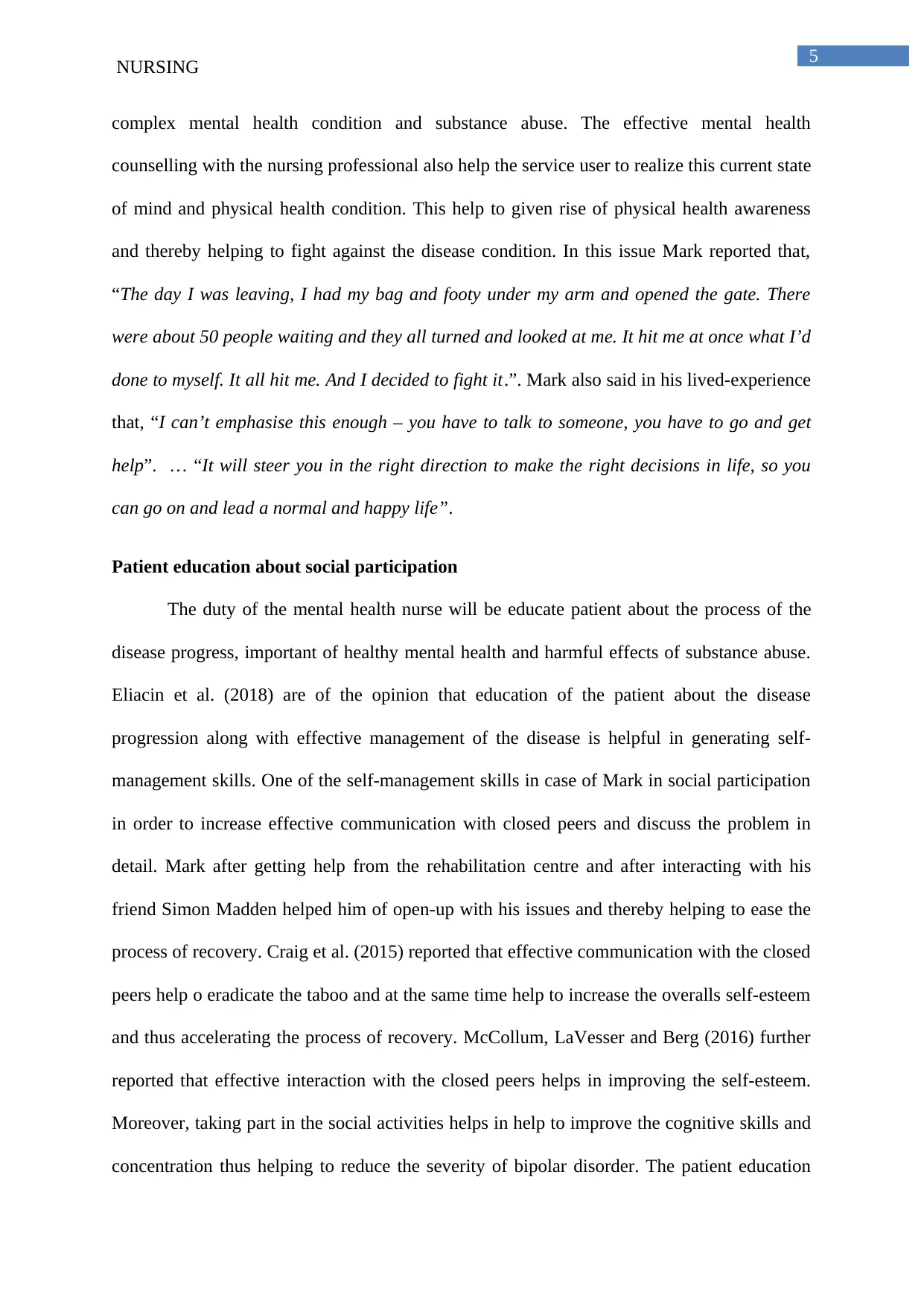
5
NURSING
complex mental health condition and substance abuse. The effective mental health
counselling with the nursing professional also help the service user to realize this current state
of mind and physical health condition. This help to given rise of physical health awareness
and thereby helping to fight against the disease condition. In this issue Mark reported that,
“The day I was leaving, I had my bag and footy under my arm and opened the gate. There
were about 50 people waiting and they all turned and looked at me. It hit me at once what I’d
done to myself. It all hit me. And I decided to fight it.”. Mark also said in his lived-experience
that, “I can’t emphasise this enough – you have to talk to someone, you have to go and get
help”. … “It will steer you in the right direction to make the right decisions in life, so you
can go on and lead a normal and happy life”.
Patient education about social participation
The duty of the mental health nurse will be educate patient about the process of the
disease progress, important of healthy mental health and harmful effects of substance abuse.
Eliacin et al. (2018) are of the opinion that education of the patient about the disease
progression along with effective management of the disease is helpful in generating self-
management skills. One of the self-management skills in case of Mark in social participation
in order to increase effective communication with closed peers and discuss the problem in
detail. Mark after getting help from the rehabilitation centre and after interacting with his
friend Simon Madden helped him of open-up with his issues and thereby helping to ease the
process of recovery. Craig et al. (2015) reported that effective communication with the closed
peers help o eradicate the taboo and at the same time help to increase the overalls self-esteem
and thus accelerating the process of recovery. McCollum, LaVesser and Berg (2016) further
reported that effective interaction with the closed peers helps in improving the self-esteem.
Moreover, taking part in the social activities helps in help to improve the cognitive skills and
concentration thus helping to reduce the severity of bipolar disorder. The patient education
NURSING
complex mental health condition and substance abuse. The effective mental health
counselling with the nursing professional also help the service user to realize this current state
of mind and physical health condition. This help to given rise of physical health awareness
and thereby helping to fight against the disease condition. In this issue Mark reported that,
“The day I was leaving, I had my bag and footy under my arm and opened the gate. There
were about 50 people waiting and they all turned and looked at me. It hit me at once what I’d
done to myself. It all hit me. And I decided to fight it.”. Mark also said in his lived-experience
that, “I can’t emphasise this enough – you have to talk to someone, you have to go and get
help”. … “It will steer you in the right direction to make the right decisions in life, so you
can go on and lead a normal and happy life”.
Patient education about social participation
The duty of the mental health nurse will be educate patient about the process of the
disease progress, important of healthy mental health and harmful effects of substance abuse.
Eliacin et al. (2018) are of the opinion that education of the patient about the disease
progression along with effective management of the disease is helpful in generating self-
management skills. One of the self-management skills in case of Mark in social participation
in order to increase effective communication with closed peers and discuss the problem in
detail. Mark after getting help from the rehabilitation centre and after interacting with his
friend Simon Madden helped him of open-up with his issues and thereby helping to ease the
process of recovery. Craig et al. (2015) reported that effective communication with the closed
peers help o eradicate the taboo and at the same time help to increase the overalls self-esteem
and thus accelerating the process of recovery. McCollum, LaVesser and Berg (2016) further
reported that effective interaction with the closed peers helps in improving the self-esteem.
Moreover, taking part in the social activities helps in help to improve the cognitive skills and
concentration thus helping to reduce the severity of bipolar disorder. The patient education
⊘ This is a preview!⊘
Do you want full access?
Subscribe today to unlock all pages.

Trusted by 1+ million students worldwide
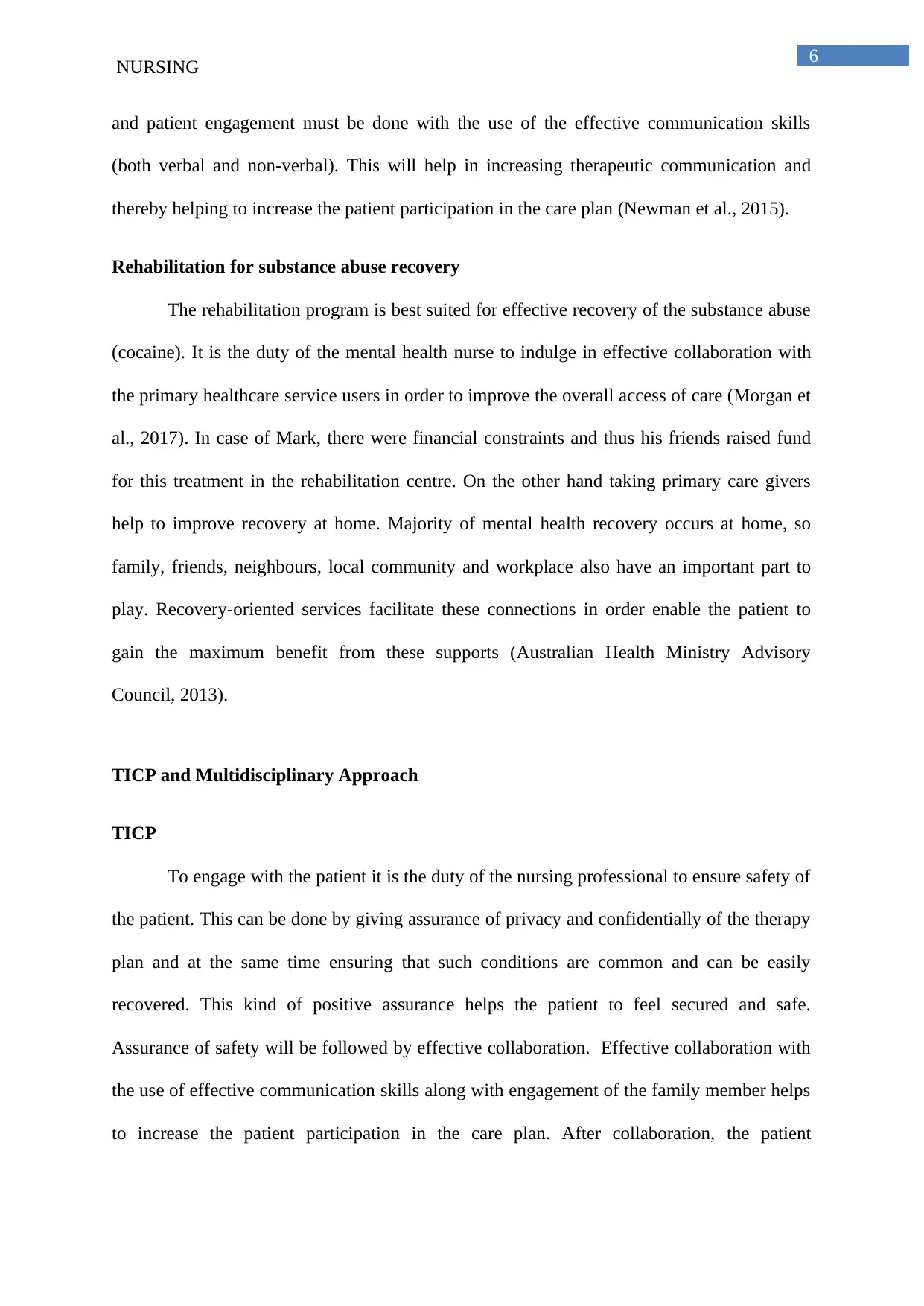
6
NURSING
and patient engagement must be done with the use of the effective communication skills
(both verbal and non-verbal). This will help in increasing therapeutic communication and
thereby helping to increase the patient participation in the care plan (Newman et al., 2015).
Rehabilitation for substance abuse recovery
The rehabilitation program is best suited for effective recovery of the substance abuse
(cocaine). It is the duty of the mental health nurse to indulge in effective collaboration with
the primary healthcare service users in order to improve the overall access of care (Morgan et
al., 2017). In case of Mark, there were financial constraints and thus his friends raised fund
for this treatment in the rehabilitation centre. On the other hand taking primary care givers
help to improve recovery at home. Majority of mental health recovery occurs at home, so
family, friends, neighbours, local community and workplace also have an important part to
play. Recovery-oriented services facilitate these connections in order enable the patient to
gain the maximum benefit from these supports (Australian Health Ministry Advisory
Council, 2013).
TICP and Multidisciplinary Approach
TICP
To engage with the patient it is the duty of the nursing professional to ensure safety of
the patient. This can be done by giving assurance of privacy and confidentially of the therapy
plan and at the same time ensuring that such conditions are common and can be easily
recovered. This kind of positive assurance helps the patient to feel secured and safe.
Assurance of safety will be followed by effective collaboration. Effective collaboration with
the use of effective communication skills along with engagement of the family member helps
to increase the patient participation in the care plan. After collaboration, the patient
NURSING
and patient engagement must be done with the use of the effective communication skills
(both verbal and non-verbal). This will help in increasing therapeutic communication and
thereby helping to increase the patient participation in the care plan (Newman et al., 2015).
Rehabilitation for substance abuse recovery
The rehabilitation program is best suited for effective recovery of the substance abuse
(cocaine). It is the duty of the mental health nurse to indulge in effective collaboration with
the primary healthcare service users in order to improve the overall access of care (Morgan et
al., 2017). In case of Mark, there were financial constraints and thus his friends raised fund
for this treatment in the rehabilitation centre. On the other hand taking primary care givers
help to improve recovery at home. Majority of mental health recovery occurs at home, so
family, friends, neighbours, local community and workplace also have an important part to
play. Recovery-oriented services facilitate these connections in order enable the patient to
gain the maximum benefit from these supports (Australian Health Ministry Advisory
Council, 2013).
TICP and Multidisciplinary Approach
TICP
To engage with the patient it is the duty of the nursing professional to ensure safety of
the patient. This can be done by giving assurance of privacy and confidentially of the therapy
plan and at the same time ensuring that such conditions are common and can be easily
recovered. This kind of positive assurance helps the patient to feel secured and safe.
Assurance of safety will be followed by effective collaboration. Effective collaboration with
the use of effective communication skills along with engagement of the family member helps
to increase the patient participation in the care plan. After collaboration, the patient
Paraphrase This Document
Need a fresh take? Get an instant paraphrase of this document with our AI Paraphraser
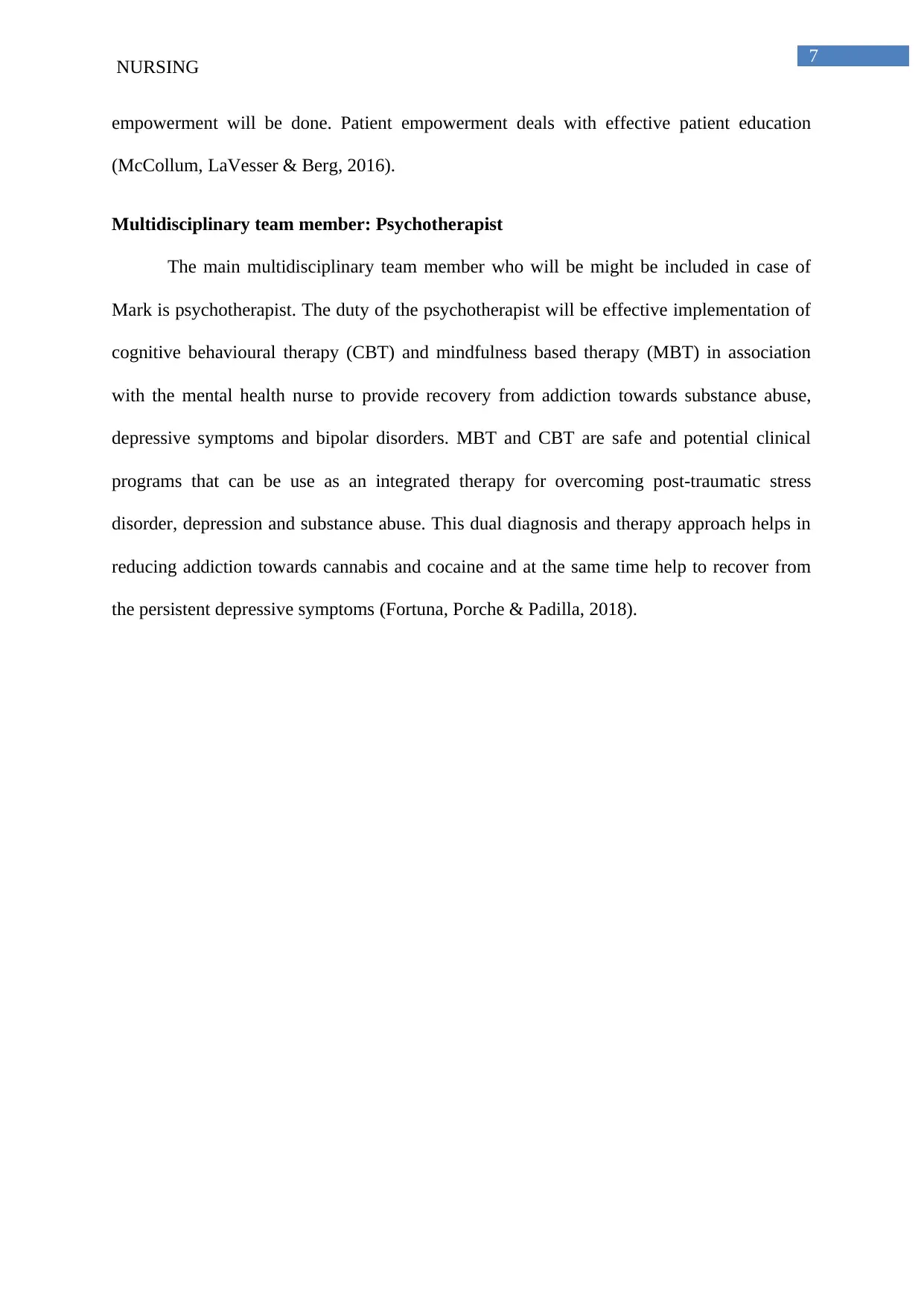
7
NURSING
empowerment will be done. Patient empowerment deals with effective patient education
(McCollum, LaVesser & Berg, 2016).
Multidisciplinary team member: Psychotherapist
The main multidisciplinary team member who will be might be included in case of
Mark is psychotherapist. The duty of the psychotherapist will be effective implementation of
cognitive behavioural therapy (CBT) and mindfulness based therapy (MBT) in association
with the mental health nurse to provide recovery from addiction towards substance abuse,
depressive symptoms and bipolar disorders. MBT and CBT are safe and potential clinical
programs that can be use as an integrated therapy for overcoming post-traumatic stress
disorder, depression and substance abuse. This dual diagnosis and therapy approach helps in
reducing addiction towards cannabis and cocaine and at the same time help to recover from
the persistent depressive symptoms (Fortuna, Porche & Padilla, 2018).
NURSING
empowerment will be done. Patient empowerment deals with effective patient education
(McCollum, LaVesser & Berg, 2016).
Multidisciplinary team member: Psychotherapist
The main multidisciplinary team member who will be might be included in case of
Mark is psychotherapist. The duty of the psychotherapist will be effective implementation of
cognitive behavioural therapy (CBT) and mindfulness based therapy (MBT) in association
with the mental health nurse to provide recovery from addiction towards substance abuse,
depressive symptoms and bipolar disorders. MBT and CBT are safe and potential clinical
programs that can be use as an integrated therapy for overcoming post-traumatic stress
disorder, depression and substance abuse. This dual diagnosis and therapy approach helps in
reducing addiction towards cannabis and cocaine and at the same time help to recover from
the persistent depressive symptoms (Fortuna, Porche & Padilla, 2018).
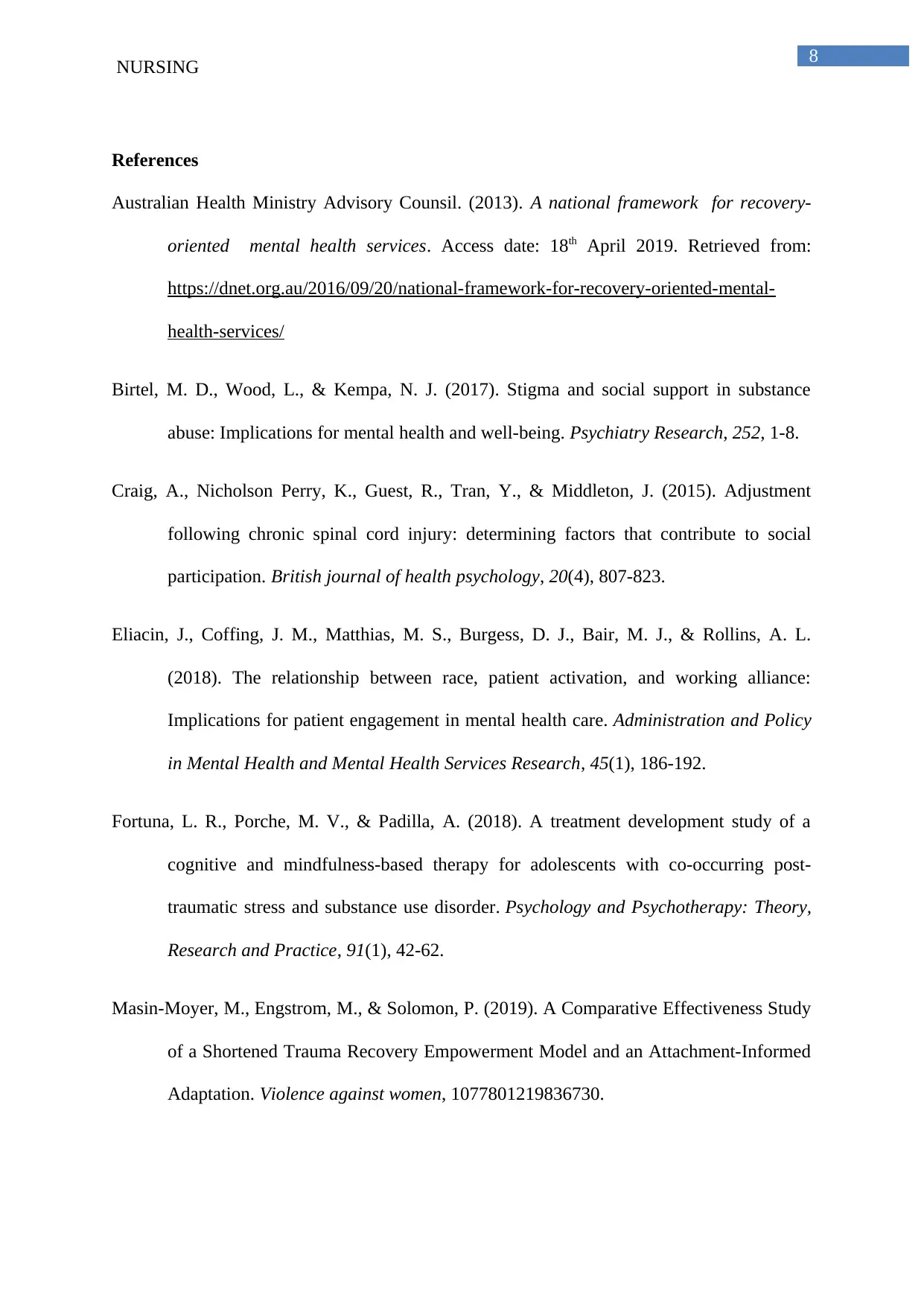
8
NURSING
References
Australian Health Ministry Advisory Counsil. (2013). A national framework for recovery-
oriented mental health services. Access date: 18th April 2019. Retrieved from:
https://dnet.org.au/2016/09/20/national-framework-for-recovery-oriented-mental-
health-services/
Birtel, M. D., Wood, L., & Kempa, N. J. (2017). Stigma and social support in substance
abuse: Implications for mental health and well-being. Psychiatry Research, 252, 1-8.
Craig, A., Nicholson Perry, K., Guest, R., Tran, Y., & Middleton, J. (2015). Adjustment
following chronic spinal cord injury: determining factors that contribute to social
participation. British journal of health psychology, 20(4), 807-823.
Eliacin, J., Coffing, J. M., Matthias, M. S., Burgess, D. J., Bair, M. J., & Rollins, A. L.
(2018). The relationship between race, patient activation, and working alliance:
Implications for patient engagement in mental health care. Administration and Policy
in Mental Health and Mental Health Services Research, 45(1), 186-192.
Fortuna, L. R., Porche, M. V., & Padilla, A. (2018). A treatment development study of a
cognitive and mindfulness‐based therapy for adolescents with co‐occurring post‐
traumatic stress and substance use disorder. Psychology and Psychotherapy: Theory,
Research and Practice, 91(1), 42-62.
Masin-Moyer, M., Engstrom, M., & Solomon, P. (2019). A Comparative Effectiveness Study
of a Shortened Trauma Recovery Empowerment Model and an Attachment-Informed
Adaptation. Violence against women, 1077801219836730.
NURSING
References
Australian Health Ministry Advisory Counsil. (2013). A national framework for recovery-
oriented mental health services. Access date: 18th April 2019. Retrieved from:
https://dnet.org.au/2016/09/20/national-framework-for-recovery-oriented-mental-
health-services/
Birtel, M. D., Wood, L., & Kempa, N. J. (2017). Stigma and social support in substance
abuse: Implications for mental health and well-being. Psychiatry Research, 252, 1-8.
Craig, A., Nicholson Perry, K., Guest, R., Tran, Y., & Middleton, J. (2015). Adjustment
following chronic spinal cord injury: determining factors that contribute to social
participation. British journal of health psychology, 20(4), 807-823.
Eliacin, J., Coffing, J. M., Matthias, M. S., Burgess, D. J., Bair, M. J., & Rollins, A. L.
(2018). The relationship between race, patient activation, and working alliance:
Implications for patient engagement in mental health care. Administration and Policy
in Mental Health and Mental Health Services Research, 45(1), 186-192.
Fortuna, L. R., Porche, M. V., & Padilla, A. (2018). A treatment development study of a
cognitive and mindfulness‐based therapy for adolescents with co‐occurring post‐
traumatic stress and substance use disorder. Psychology and Psychotherapy: Theory,
Research and Practice, 91(1), 42-62.
Masin-Moyer, M., Engstrom, M., & Solomon, P. (2019). A Comparative Effectiveness Study
of a Shortened Trauma Recovery Empowerment Model and an Attachment-Informed
Adaptation. Violence against women, 1077801219836730.
⊘ This is a preview!⊘
Do you want full access?
Subscribe today to unlock all pages.

Trusted by 1+ million students worldwide
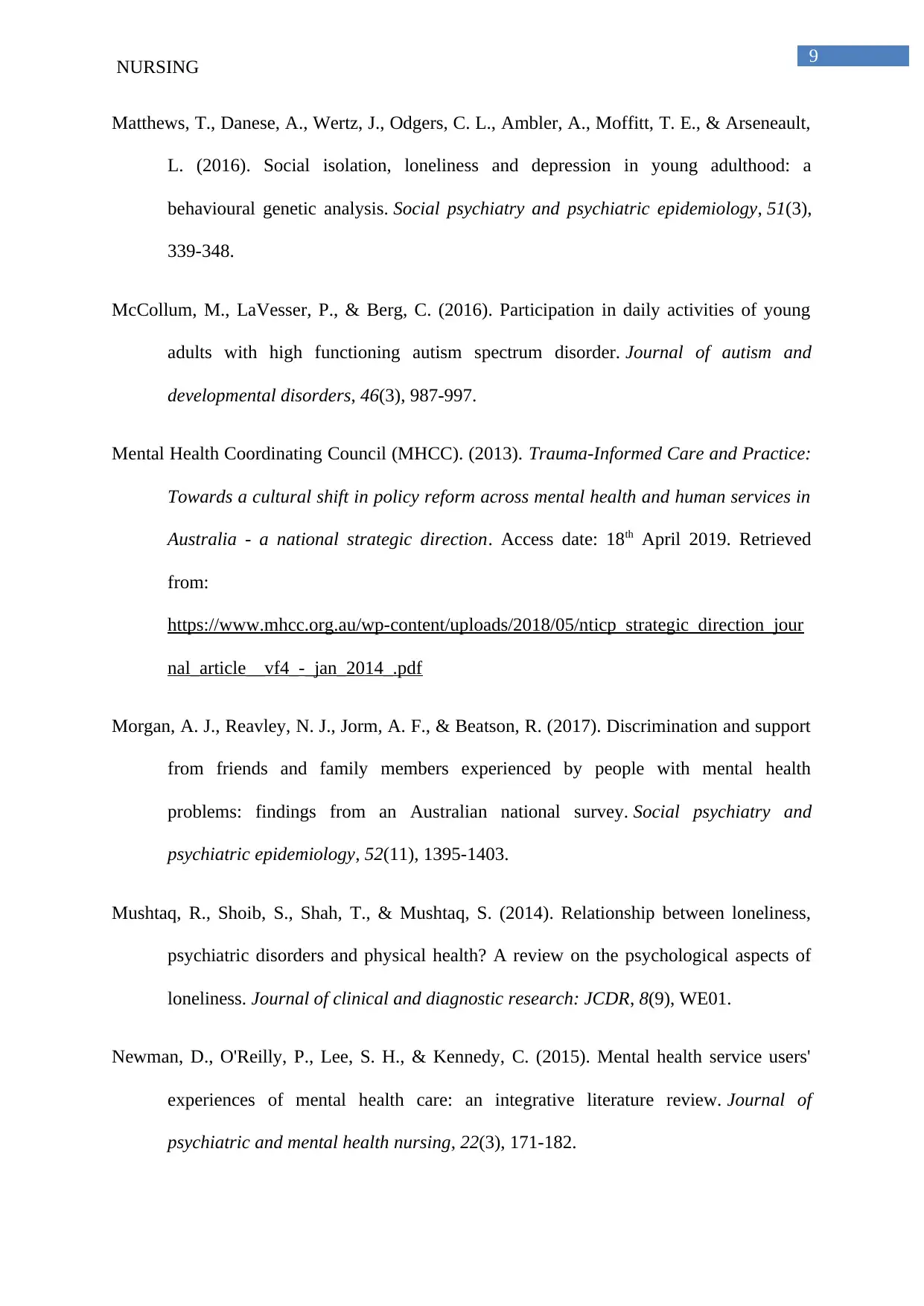
9
NURSING
Matthews, T., Danese, A., Wertz, J., Odgers, C. L., Ambler, A., Moffitt, T. E., & Arseneault,
L. (2016). Social isolation, loneliness and depression in young adulthood: a
behavioural genetic analysis. Social psychiatry and psychiatric epidemiology, 51(3),
339-348.
McCollum, M., LaVesser, P., & Berg, C. (2016). Participation in daily activities of young
adults with high functioning autism spectrum disorder. Journal of autism and
developmental disorders, 46(3), 987-997.
Mental Health Coordinating Council (MHCC). (2013). Trauma-Informed Care and Practice:
Towards a cultural shift in policy reform across mental health and human services in
Australia - a national strategic direction. Access date: 18th April 2019. Retrieved
from:
https://www.mhcc.org.au/wp-content/uploads/2018/05/nticp_strategic_direction_jour
nal_article__vf4_-_jan_2014_.pdf
Morgan, A. J., Reavley, N. J., Jorm, A. F., & Beatson, R. (2017). Discrimination and support
from friends and family members experienced by people with mental health
problems: findings from an Australian national survey. Social psychiatry and
psychiatric epidemiology, 52(11), 1395-1403.
Mushtaq, R., Shoib, S., Shah, T., & Mushtaq, S. (2014). Relationship between loneliness,
psychiatric disorders and physical health? A review on the psychological aspects of
loneliness. Journal of clinical and diagnostic research: JCDR, 8(9), WE01.
Newman, D., O'Reilly, P., Lee, S. H., & Kennedy, C. (2015). Mental health service users'
experiences of mental health care: an integrative literature review. Journal of
psychiatric and mental health nursing, 22(3), 171-182.
NURSING
Matthews, T., Danese, A., Wertz, J., Odgers, C. L., Ambler, A., Moffitt, T. E., & Arseneault,
L. (2016). Social isolation, loneliness and depression in young adulthood: a
behavioural genetic analysis. Social psychiatry and psychiatric epidemiology, 51(3),
339-348.
McCollum, M., LaVesser, P., & Berg, C. (2016). Participation in daily activities of young
adults with high functioning autism spectrum disorder. Journal of autism and
developmental disorders, 46(3), 987-997.
Mental Health Coordinating Council (MHCC). (2013). Trauma-Informed Care and Practice:
Towards a cultural shift in policy reform across mental health and human services in
Australia - a national strategic direction. Access date: 18th April 2019. Retrieved
from:
https://www.mhcc.org.au/wp-content/uploads/2018/05/nticp_strategic_direction_jour
nal_article__vf4_-_jan_2014_.pdf
Morgan, A. J., Reavley, N. J., Jorm, A. F., & Beatson, R. (2017). Discrimination and support
from friends and family members experienced by people with mental health
problems: findings from an Australian national survey. Social psychiatry and
psychiatric epidemiology, 52(11), 1395-1403.
Mushtaq, R., Shoib, S., Shah, T., & Mushtaq, S. (2014). Relationship between loneliness,
psychiatric disorders and physical health? A review on the psychological aspects of
loneliness. Journal of clinical and diagnostic research: JCDR, 8(9), WE01.
Newman, D., O'Reilly, P., Lee, S. H., & Kennedy, C. (2015). Mental health service users'
experiences of mental health care: an integrative literature review. Journal of
psychiatric and mental health nursing, 22(3), 171-182.
Paraphrase This Document
Need a fresh take? Get an instant paraphrase of this document with our AI Paraphraser
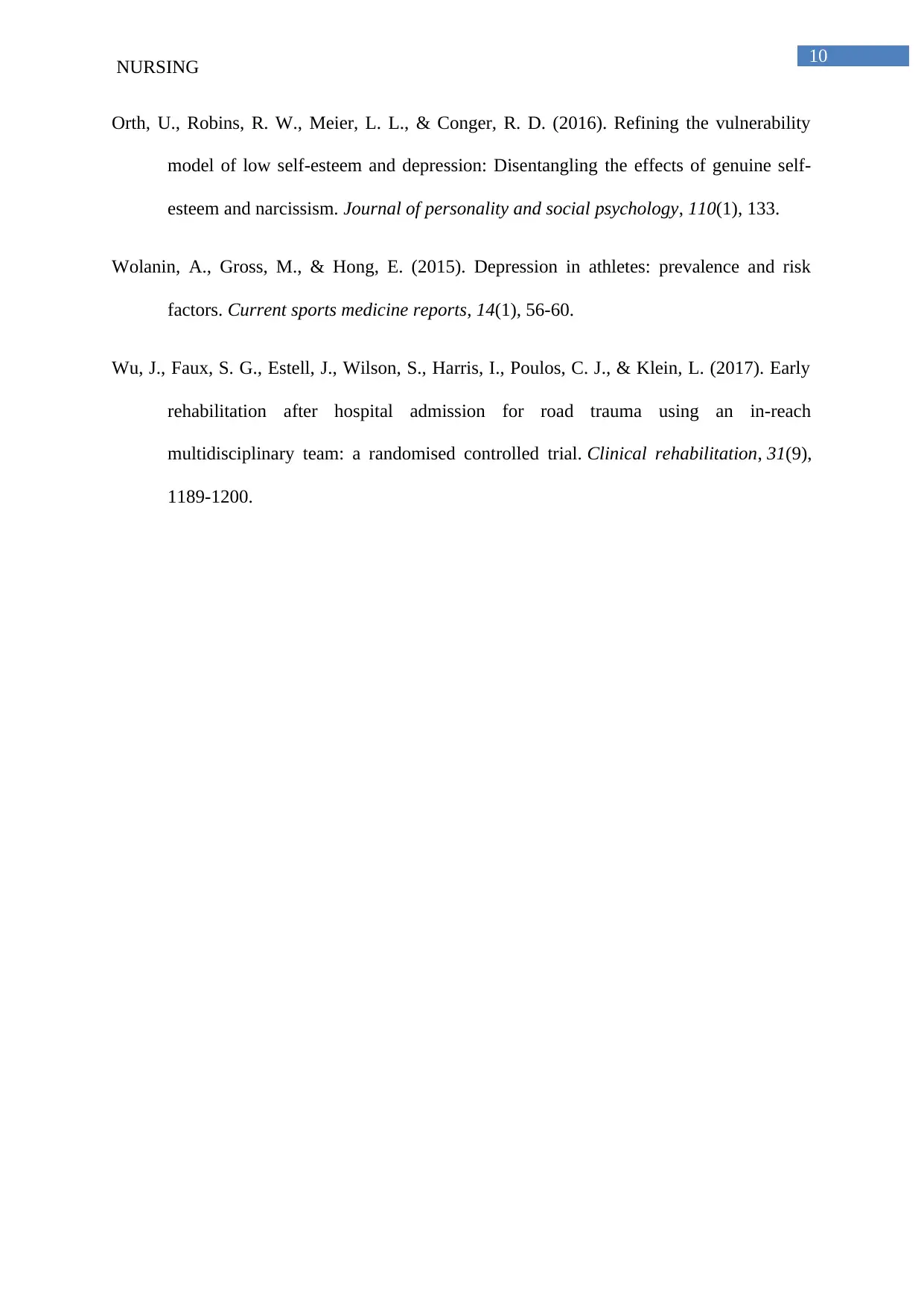
10
NURSING
Orth, U., Robins, R. W., Meier, L. L., & Conger, R. D. (2016). Refining the vulnerability
model of low self-esteem and depression: Disentangling the effects of genuine self-
esteem and narcissism. Journal of personality and social psychology, 110(1), 133.
Wolanin, A., Gross, M., & Hong, E. (2015). Depression in athletes: prevalence and risk
factors. Current sports medicine reports, 14(1), 56-60.
Wu, J., Faux, S. G., Estell, J., Wilson, S., Harris, I., Poulos, C. J., & Klein, L. (2017). Early
rehabilitation after hospital admission for road trauma using an in-reach
multidisciplinary team: a randomised controlled trial. Clinical rehabilitation, 31(9),
1189-1200.
NURSING
Orth, U., Robins, R. W., Meier, L. L., & Conger, R. D. (2016). Refining the vulnerability
model of low self-esteem and depression: Disentangling the effects of genuine self-
esteem and narcissism. Journal of personality and social psychology, 110(1), 133.
Wolanin, A., Gross, M., & Hong, E. (2015). Depression in athletes: prevalence and risk
factors. Current sports medicine reports, 14(1), 56-60.
Wu, J., Faux, S. G., Estell, J., Wilson, S., Harris, I., Poulos, C. J., & Klein, L. (2017). Early
rehabilitation after hospital admission for road trauma using an in-reach
multidisciplinary team: a randomised controlled trial. Clinical rehabilitation, 31(9),
1189-1200.
1 out of 11
Related Documents
Your All-in-One AI-Powered Toolkit for Academic Success.
+13062052269
info@desklib.com
Available 24*7 on WhatsApp / Email
![[object Object]](/_next/static/media/star-bottom.7253800d.svg)
Unlock your academic potential
Copyright © 2020–2026 A2Z Services. All Rights Reserved. Developed and managed by ZUCOL.





